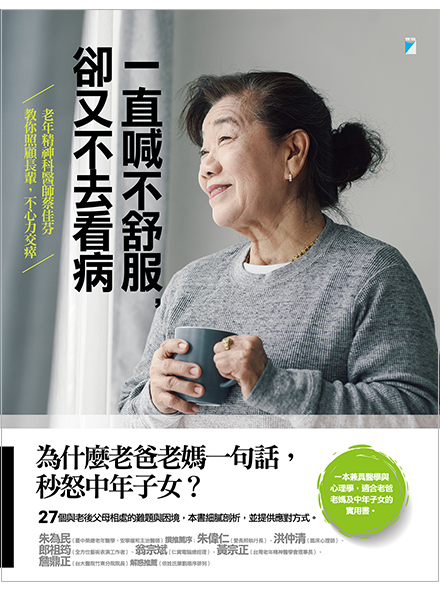This timely book addressing the relationships between aging parents and their adult children. Twenty-seven commonly seen points of conflict and disagreement are explored to reveal their underlying causes and practical means to resolve them. An invaluable handbook for parents and children hoping to improve their intergenerational relationships!
In our rapidly aging society, the challenging relationships between adult children and their elderly parents has become a hot topic of discussion. When there is a lack of understanding between the two generations, even mundane interactions can lead to arguments, and relationships can rapidly turn frosty. With her in-depth knowledge of both medicine and psychology, Dr. Tsai Chia-Fen analyzes the sources of conflict in these relationships, and arms readers with practical tips to better handle their cross-generational relationships.
Part one addresses the problems faced by adult children when trying to communicate and get along with aging parents. In these situations it is critical to identify the underlying sources of the problem. Are aging parents suffering from a slowly worsening chronic condition? Is pain wearing them down and making them irritable? Do they still see their offspring as children, causing them to interfere in their adult lives? Each cause has identifiable signs, which are indexed for easy reference.
Part two is directed to the elderly, reminding them that the challenges they are experiencing may be more common than they think. Ordinary memory loss can lead to fears of dementia. Loss of mobility and function can lead to dependence on health supplements as a form of self-soothing. These are all ordinary fears and reactions, and must be adequately understood and communicated so appropriate measures can be taken. Parents should be aware of the need to regularly update their adult children about the difficulties they are facing, while both parties need to practice being sympathetic to the other’s point of view .
As director of the department of geriatric psychiatry at a major hospital, Dr. Tsai Chia-Fen sees nearly a thousand elderly patients every month. Utilizing insights from both medicine and psychology, Dr. Tsai provides a straightforward analysis of behavioral patterns and underlying conditions frequently observed in aging parents. With its abundance of practical knowledge, her book is a powerful tool to help thaw the sometimes icy relationship patterns that form as the older generation enters their waning years.
